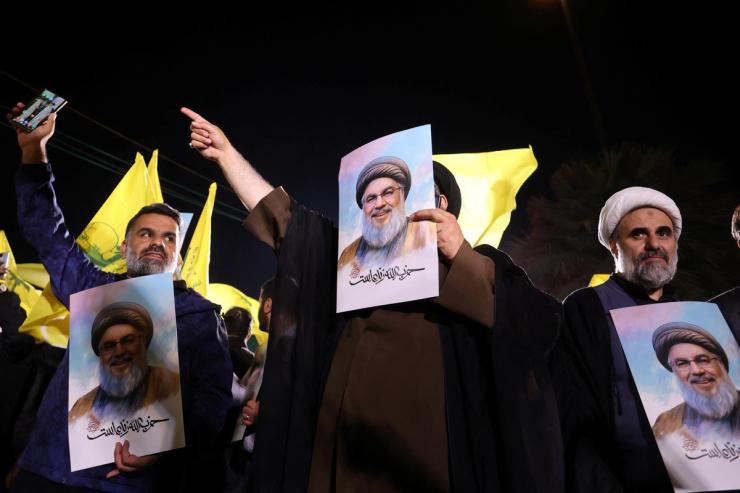The News
Hours after Israel announced it had begun a limited ground operation in Lebanon targeting Hezbollah, world leaders amplified their calls for a ceasefire and voiced concern over the conflict spiraling into a regional war with Iran, which fired rockets into Israel Tuesday.
The escalation comes after weeks of Israeli attacks targeting Hezbollah, the Iran-backed paramilitary group and Lebanon’s strongest political party. Many of the group’s most senior leaders have been killed and its forces degraded, at a huge cost to Lebanese civilians: More than 1,500 have been killed since the cross-border attacks began last year, and up to a million displaced, according to Lebanese authorities.
The US reiterated support for Israel’s right to defend itself, and urged a diplomatic resolution, others called for de-escalation, with some Gulf leaders affirming their support for Lebanon.
The View From The United States
US President Joe Biden called for a ceasefire and said he would be “comfortable” with Israel halting its ground invasion into Lebanon. The US defense secretary reiterated that the US supports Israel’s right to defend itself, while calling for a “diplomatic resolution” that would enable displaced civilians to return home. He also warned Tehran of “serious consequences” if it directly attacked Israel.
But the US response repeats the “pattern of American impotency and Israeli defiance” since the conflict in Gaza began, CNN wrote, where the US is unable to rein in its ally’s actions or exert significant control over the escalating regional conflict. Israel often acts before consulting the Biden administration, making the US “appear a spectator rather than an active player in events,” CNN argued, at a cost to the country’s perception of a global power.
The View From The Gulf
The United Arab Emirates Ministry of Foreign Affairs “reaffirmed its unwavering position towards the unity of Lebanon, national sovereignty, and territorial integrity,” according to a Tuesday statement. The country’s president also promised a $100 million relief package for Lebanon. Qatar’s foreign affairs minister said in a post on X that “aggression on Lebanon will inflict the worst,” and that “standing with the brotherly people of Lebanon is not just a moral duty, but an imperative necessity.”
Gulf countries, which have generally tried to steer clear of involvement in the conflict in Gaza, began promising to participate in a US-backed peacekeeping force in the region over the summer, a move that could represent a profound shift for the region and would be a “cost-free” way for Gulf states to make friends in the US, Middle East Eye noted — though that was before the recent escalation in Lebanon.
The View From Europe
Leaders from Italy, Spain, and the UK called for a de-escalation to avoid the conflict expanding throughout the Middle East, while NATO’s new secretary-general Mark Rutte said during his inauguration speech that he hoped “hostilities will end as soon as possible.”
The EU has so far been unable to make any meaningful policy decision toward de-escalation in the Middle East, and the key issue limiting action could be the EU itself, DW noted. Foreign policy decisions require unanimous approval, but bloc member states are too divided on the conflict.
The View From Turkey
Turkish President Recep Tayyip Erdogan said during an address to the country’s state broadcaster that he believes Israel may target Turkey next, after Gaza and Lebanon. Erdogan emphasized that the consequences of Israel’s current incursion “will not be similar” to the last one, apparently referring to Israel’s past clashes with Hezbollah, which stretch back years.
Turkey and Israel’s relationship has been at a “breaking point” since the Oct. 7 Hamas attack, The Economist noted, though the two countries may not have an interest in rupturing their ties entirely, given the lucrative trade between them.
The View From Russia
Russia’s Ministry of Defense expressed solidarity with Lebanon in a statement, and Kremlin spokesperson Dmitry Peskov also condemned an Israeli strike on the Syrian capital of Damascus early Tuesday. Peskov warned that “the geography of hostilities is expanding, which is further destabilizing the region and increasing tensions.”
Russia has tried to position itself as a power broker in the Middle East since the Syrian civil war erupted in 2015, in an attempt “to reserve a seat among other players who seek to design a new regional security architecture,” though its impact beyond Syria has so far been limited, experts wrote for Carnegie Endowment.
The View From China
Top Chinese diplomats met with Iranian leaders over the past week and pledged support for Tehran in safeguarding its “sovereignty, security, territorial integrity, and national dignity,” amid Israel’s bombardment of Lebanon.
The US has long tried to press Beijing into using its trade relationship to rein in Tehran’s actions in the Middle East. But even though some experts believe China is “the single country with the greatest ability to influence Iran, if it wants to be,” the task wouldn’t be that simple, Foreign Policy argued. One analyst noted that China’s leverage over Iran in oil sales and trade is both “politically and logistically challenging to use.”

